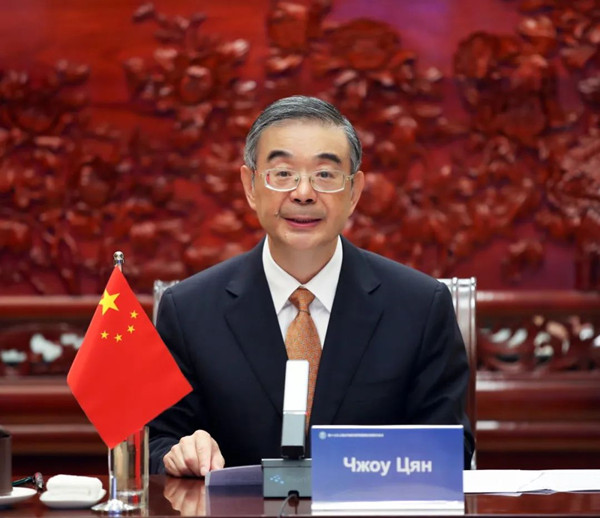Zhou Qiang urges more judicial application of artificial intelligence
Zhou Qiang, chief justice and president of the Supreme People's Court (SPC) of China, urged for more practical international cooperation to promote the deep integration of artificial intelligence (AI) into judicial work, in a bid to contribute to the building of a community with a shared future in cyberspace.
He made those remarks while attending the 17th conference of presidents of supreme courts of Shanghai Cooperation Organization (SCO) member states on Aug 18, where he delivered a keynote speech on the demonstration of AI and automation in judicial procedures.

Zhou Qiang, chief justice and president of the Supreme People's Court (SPC) of China, attends the 17th conference of presidents of supreme courts of Shanghai Cooperation Organization (SCO) member states and delivers a keynote speech, Aug 18, 2022. [Photo/hbyhlw.com]
Zhou said that the vigorous development of the new generation of AI around the globe is transforming people’s way of life and production, and injecting new momentum into socioeconomic development. Courts in China have leveraged the development of AI technology and promoted its in-depth application in the judicial field, which has supported the establishment of a smart court information system across the country, as well as the modernization of the trial system and capacity in China.
Zhou introduced the application of AI and automation in China’s judicial procedures. By fully integrating AI technology into judicial work, China has boosted online litigation services, solidified and expanded the achievements made in the construction of the one-stop diversified dispute resolution and litigation service system, strengthened the construction of the internet court and released three sets of rules for online litigation, mediation and operation, according to Zhou.
AI has been extensively applied in trial execution work in areas including the development of smart platforms to assist in case handling, the improvement of online monitoring and control systems, the automatic identification and distribution of cases based on complexity, speech recognition and transcription, and automatic verification of evidence, all of which have helped to improve the quality and efficiency of judicial work, Zhou said.
Efforts were also made to integrate AI, big data and blockchain technology, which has achieved an automated convergence of data on trial and execution work across the country and served social governance, Zhou noted.
He was also optimistic in his speech about the prospects of the application of AI and automation in the judicial field, and pledged that courts in China will adopt a sci-tech driven, problem-oriented and open approach in advancing smart court construction. The application of AI aims to achieve leapfrog development of the litigation system in the information age, build a new internet-based judicial model with Chinese characteristics, and develop a higher level of digital justice.
Yang Wanming, vice-president of the SPC, as well as justices from Russia, the Kyrgyz Republic, Tajikistan, Kazakhstan, Uzbekistan, India and Iran delivered keynote speeches at the conference.









